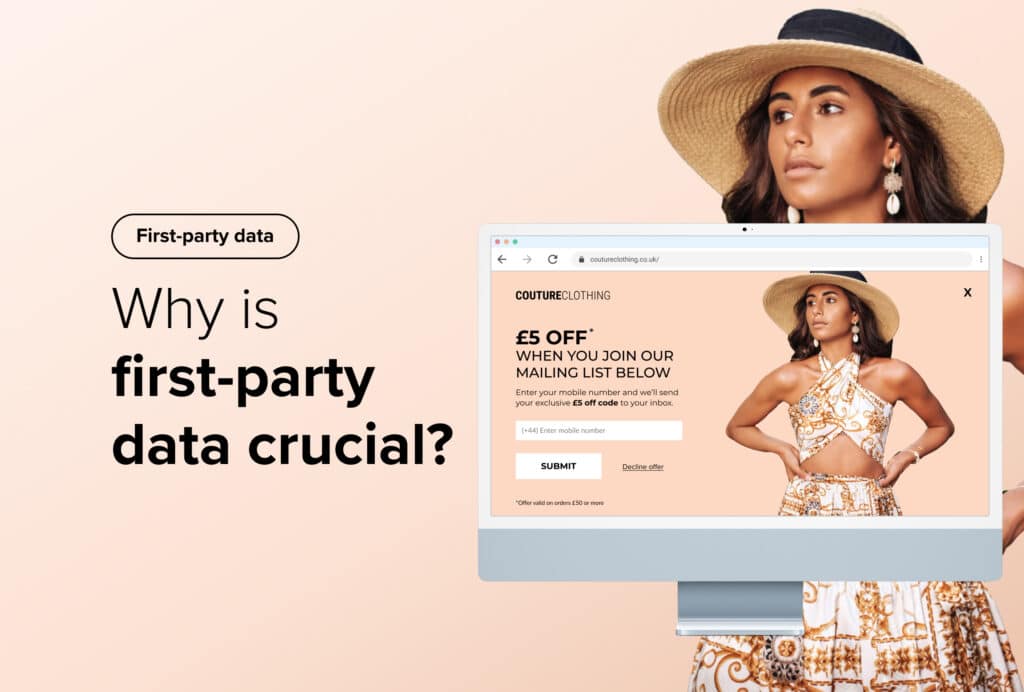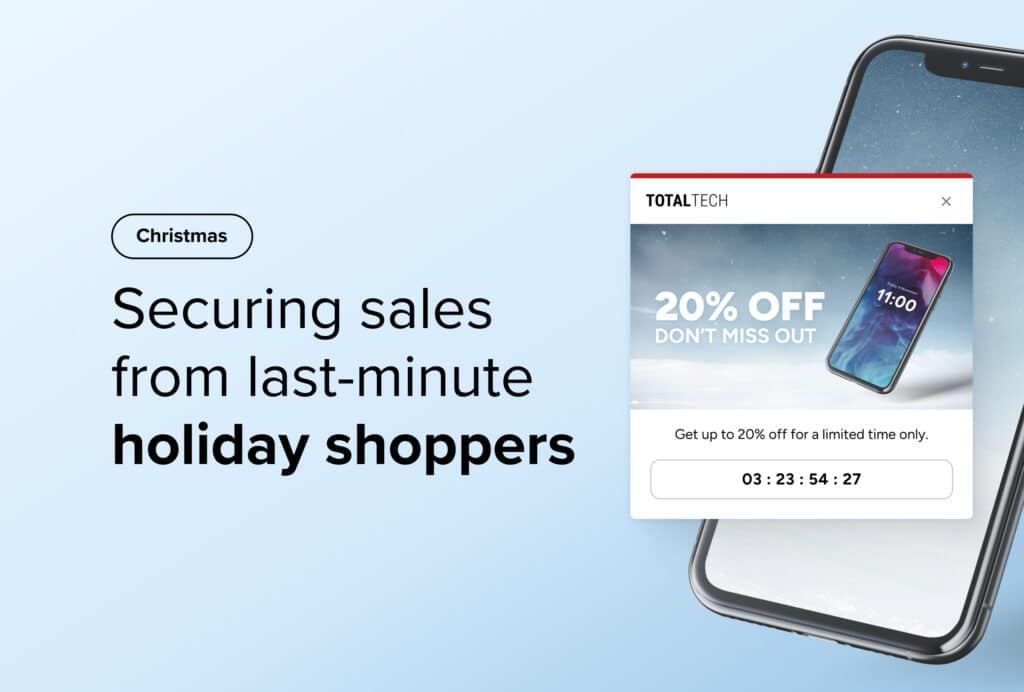What Is First-Party Data and Why Is It Important in 2024?
By Sophie Walker • Last updated: Wednesday Jul 24th, 2024

The digital space is entering a new era of privacy-first marketing.
Modern consumers have become more aware of the vast amounts of personal data that brands have access to and are choosing retailers who adhere to their right to data privacy and security.
As privacy regulations tighten, first-party data has emerged as an indispensable asset for online brands.
In this article, we’ll discuss the importance of first-party data in 2024 and how you can use it to enhance your long-term marketing strategies.
What is first-party data?
First-party data refers to the information collected directly from your shoppers as they interact with your site, app or marketing channels.
As an online retailer, you already have access to a large amount of this information.
To compile it into an actionable database, we recommend that you begin to gather data from your:
- Website interactions
- Purchase history
- Email subscriptions
- On-site behaviour
Leveraging these sources will give you an accurate and detailed understanding of your customers.
Allowing you to go on to create genuinely relevant and highly targeted marketing campaigns.
How does first-party data differ from second and third-party data?
Customer data typically falls into three categories: first-party, second-party, and third-party data.
Here are the definitions for each data type:
- First-party data is collected compliantly from your customer’s interactions, giving you control over this data.
- Second-party data is another company’s first-party data. Retailers access this through direct relationships and data-sharing arrangements.
- Third-party data is collected by entities with no relationship to the customer and is aggregated across sources, this can often lead to broad insights and inconsistency across your data set.
Third and second-party data collection methods are often viewed as intrusive and non-transparent. In contrast to this, first-party data is collected directly from your customers, voluntarily and without the need for external parties or invasive tracking methods.
This is why first-party data is becoming a crucial resource for eCommerce marketing and retargeting efforts in 2024 and beyond.
Suggested reading: To discover how you can maximise your data collection, read our article ‘6 Ways to Collect First-Party Data: Sources, Examples and Collection Methods’.
The changing digital landscape
User demand for increased privacy, transparency and control over their data has led to a lot of uncertainty in the digital landscape.
Most recently, Google scrapped its four-year-long plan to remove third-party cookies.
Instead, they’re adopting an updated approach that will see “a new experience in Chrome that lets people make an informed choice that applies across their web browsing, and they’d be able to adjust that choice at any time.”1
While you’ll still be able to use third-party cookies in your retargeting efforts on Google where users have given their consent, its sudden U-turn signals retailers need to be prepared for any eventuality.
Retailers also need to consider that Safari and Firefox have already removed third-party cookies and it’s unknown how many users will choose to opt out when Google launches its updated privacy measures.
This unexpected reconsideration should prompt retailers across the industry to re-evaluate their data usage.
Many small and medium-sized brands may heavily rely on third-party cookies for their day-to-day marketing efforts to:
- Collate data such as customer preferences and browsing activity across multiple websites.
- Retarget and advertise to users across sites.
- Gain insight and collect information on broader audiences.
As the industry shifts towards prioritising compliant data practices, relying solely on these methods is no longer advisable.
Businesses must adapt by leveraging first-party data and adopting transparent data collection techniques to meet evolving consumer expectations and regulatory requirements.
Benefits of first-party data in 2024
First-party data will play an essential role in privacy-first marketing strategies.
Let’s delve into the benefits and opportunities first-party data can provide for your brand.
1. Increased accuracy and relevancy
First-party data offers an increase in reliability and relevancy as it comes directly from genuine user interactions.
This eliminates any room for potential errors or discrepancies through third-party data collection methods.
As you can identify and monitor which first-party metrics you want to prioritise going forward, you can ensure that the data collected is both relevant and beneficial to your overall business objectives.
The reliability and accuracy of first-party data will play a crucial role in improving your business performance and shaping your marketing campaigns for the future.
2. Enhanced personalisation
First-party data presents a valuable opportunity for you to personalise your customer experiences and create targeted marketing campaigns.
We recommend using your first-party data to:
- Enhance on-site personalisation: Deploy dynamic Recommendation units across multiple touchpoints on-site. Using your customer’s behavioural data, you can connect shoppers to their perfect purchase and increase your average order values.
- Retarget abandoned browsers: Integrate Recommendations into your Email & Messaging campaigns to draw lost shoppers back into the buying funnel. Send targeted email sequences based on individual on-site behaviour to encourage conversions and retention.
Using customer data in this way allows you to take a personalised, holistic approach across multiple marketing channels. The level of hyper-personalisation this approach unlocks will help to drive effortless sales and deliver marketing experiences that resonate on a deeper level.
3. Comprehensive customer insights
Your first-party data serves as a bank of comprehensive insights into your audience’s wants and needs.
To create a deep understanding of your customers, you might look specifically at their:
- Preferences
- On-site behaviours and interactions
- Past purchases and buying analytics
- Demographic information
- Engagement metrics
These insights can be used to identify behavioural patterns, popular products, and emerging trends.
Using this information to fuel your future marketing campaigns will ultimately help you to improve your business outcomes.
4. Prioritisation of compliance and trust
First-party data makes it easy for retailers to follow privacy laws and remain compliant.
Adopting transparency will make your shoppers feel more informed about the data collection process and give them greater control over the information they choose to share with your brand.
In return, this openness encourages users to feel comfortable with sharing additional information such as their email or mobile number.
You can also expect to foster long-term loyalty, as your customers feel secure and safe shopping on your site.
Overall, focussing on first-party data and compliant practices will help establish trust and loyalty amongst your audiences, ultimately driving growth for your brand.
What you can do: Salesfire understands the importance of first-party data in eCommerce strategies.
For example, using Salesfire’s data capture strategy men’s fashion retailer Stuarts London experienced a 159% increase in email sign-ups.
This allowed them to increase their customer data at an unprecedented scale, expanding their marketing and retargeting opportunities.
Futureproof your strategy with first-party data
The value of first-party data is unparalleled.
Now is the time for retailers to get ahead of the upcoming changes and futureproof their data strategies.
First-party data not only provides you with insight into your shopper’s purchasing and browsing behaviour but also allows you to better serve your customers with personalised marketing campaigns that secure conversions.
1 In shock decision, Google abandons third-party cookie deprecation plans | The Drum
Discover how Salesfire can help you grow your bank of customer first-party data and expand your opportunities for retargeting, email one of our experts at [email protected] or book a free demo of our tools.



